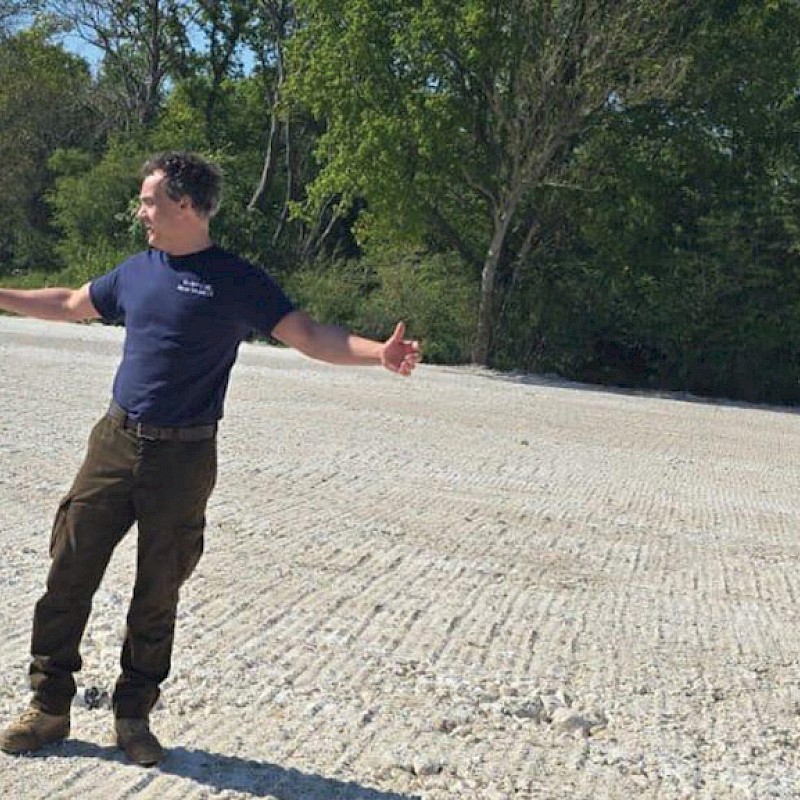Supporting BNG in Kent - John Newbury's Role in Landmark BNG Project
By , 28th July 2025
By , 28th July 2025
Biodiversity Net Gain (BNG) is rapidly reshaping land use and development across the UK - and our founder, landowner and biodiversity consultant John Newbury is at the forefront of this transition. Working closely with farmers and developers, John has played a pivotal role in facilitating a pioneering BNG scheme that highlights both the opportunities and current challenges in the marketplace.
A recent Farmers Weekly article gave an overview of our Chalksole Farm and the insights that our founder John has learnt through the creation of this Biodiversity Habitat bank. Chalksole Farm has been added to Defra's BNG register, and buyers can now access the 260 units being created from locations including Kent, Hampshire, Sussex and London.
Chalksole Farm is a crucial step toward establishing a model for BNG success in the region. While John is not a farmer, his experience with Commercial Grounds Maintenance through his company JN Gardening, and his enthusiasm for BNG means he is perfectly placed. His commitment to long-term environmental stewardship makes him an ideal candidate to demonstrate how BNG can be both practical and impactful.

With Natural England’s regulations mandating a 10% biodiversity net gain on most new developments, there is growing interest from both private and public sectors in sourcing off-site BNG units. But for landowners unfamiliar with the process, this can be daunting.
John Newbury our founder offers expert, end-to-end guidance on:
Identifying suitable land for biodiversity enhancement
Creating Habitat Management and Monitoring Plans (HMMPs)
Coordinating with ecologists and legal advisors
Registering BNG units and facilitating sales to developers
He bridges the gap between landowners and developers, ensuring both ecological integrity and commercial viability are achieved.
As highlighted in the Farmers Weekly article, setting up a Biodiversity Net Gain (BNG) enterprise can be a significant financial undertaking. John advises that careful budgeting and regular financial reviews are essential, as inflation is likely to erode returns over the 30-year duration of the agreement.
Establishing the habitat bank at Chalksole Farm is expected to cost around £250,000 - excluding ongoing maintenance. Key expenses include 30 years of local council monitoring fees, compliance monitoring by Biodiverse Consulting, the development of a habitat management and monitoring plan, soil testing, and legal fees associated with the Section 106 agreement. Additional costs cover the BNG register fee, allocation fees per unit transfer, and a range of planting and landscape costs such as high-quality native wildflower seed (£65,000), 260 trees with guards, nine-species hedging, pond creation (£7,000–£9,000), and site preparation (£45,000). Broker fees on unit sales typically range from 2–10%.
A key advantage at Chalksole is John’s extensive experience through JN Gardening, which provides a deep understanding of ground care and long-term habitat management -crucial to ensuring the habitat bank not only survives but thrives. The knowledge of what to plant and when is significant for this project. So far, we have already spread and rolled 1500t of chalk to assist in the establishment of calcareous grassland. Given the high costs, we would recommend a minimum site size of 20 to 25 hectares to make BNG viable.
John also advises caution in planning: avoid over-promising or aiming too high in your initial biodiversity targets. Instead, start with lower baselines, as these must legally be met. Exceeding them later results in positive outcomes, creating more units, whereas failing to meet overambitious targets can be costly. For example, the Habitat Management and Monitoring Plan (HMMP) can be strict on its requirements. For example, the conditions of a like-for-like replacement; if a five-year-old tree is lost, it must be replaced with another five-year-old tree. At Chalksole, our practical knowledge has already been applied through the use of stronger tree whips, helping improve establishment success and reduce early losses. Currently, there is limited insurance cover available for BNG habitat failure or disaster, making robust planning and management even more critical.
However, all is not lost. Despite the financial and logistical challenges, there is a growing network of dedicated professionals driving the BNG agenda forward. Experts such as Vicki Mordue from Biodiverse Consulting and Dan Turson from Natural England are just two of many who are passionate about the success of BNG and are working tirelessly to support landowners, developers, and policymakers alike. With the right expertise, planning, and collaboration, BNG can deliver long-term environmental and economic value - and projects like Chalksole Farm are helping to pave the way.
Before starting a BNG project, it is important to approach planning with both realism and strategy. John advises the following:
Taking these steps early will help reduce risk, improve outcomes, and ensure your BNG project is both viable and valuable in the long term.
John Newbury and the rest of the team here at Biodiversity and Habitat Solutions, are helping to shape a more sustainable approach to rural land use - one that benefits wildlife, supports farmers, and meets planning obligations in a balanced way.
If you are a landowner interested in BNG opportunities or a developer looking to secure biodiversity units, we can provide the local knowledge and practical expertise to guide your project from concept to completion.
To find out how you can get involved in Biodiversity Net Gain projects in Kent and beyond, contact our founder John Newbury today.
Phone: 01233 671025
Mobile: 07881 737642
info@biodiversityandhabitatsolutions.co.uk